Unit1_Where_did_you_go_on_vacation全单元导学案
八年级新目标上unit_1_Where_did_you_go_on_vacation_知识点
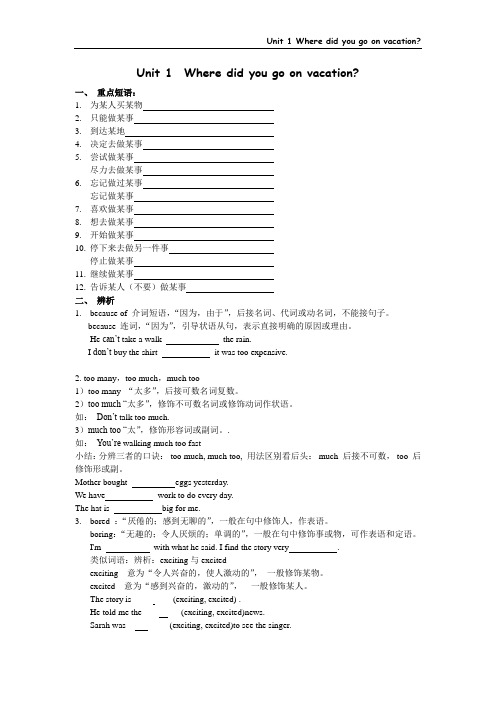
Unit 1 Where did you go on vacation?一、重点短语:1.为某人买某物2.只能做某事3.到达某地4.决定去做某事5.尝试做某事尽力去做某事6.忘记做过某事忘记做某事7.喜欢做某事8.想去做某事9.开始做某事10.停下来去做另一件事停止做某事11.继续做某事12.告诉某人(不要)做某事二、辨析1.because of 介词短语,“因为,由于”,后接名词、代词或动名词,不能接句子。
because 连词,“因为”,引导状语从句,表示直接明确的原因或理由。
He can’t take a walk the rain.I don’t buy the shirt it was too expensive.2. too many,too much,much too1)too many “太多”,后接可数名词复数。
2)too much “太多”,修饰不可数名词或修饰动词作状语。
如:Don’t talk too much.3)much too “太”,修饰形容词或副词。
.如:You’re walking much too fast小结:分辨三者的口诀:too much, much too, 用法区别看后头:much 后接不可数,too 后修饰形或副。
Mother bought eggs yesterday.We have work to do every day.The hat is big for me.3.bored :“厌倦的;感到无聊的”,一般在句中修饰人,作表语。
boring:“无趣的;令人厌烦的;单调的”,一般在句中修饰事或物,可作表语和定语。
I'm with what he said. I find the story very .类似词语:辨析:exciting与excitedexciting 意为“令人兴奋的,使人激动的”,一般修饰某物。
excited 意为“感到兴奋的,激动的”,一般修饰某人。
Unit1--Where-did-you-go-on-vacation
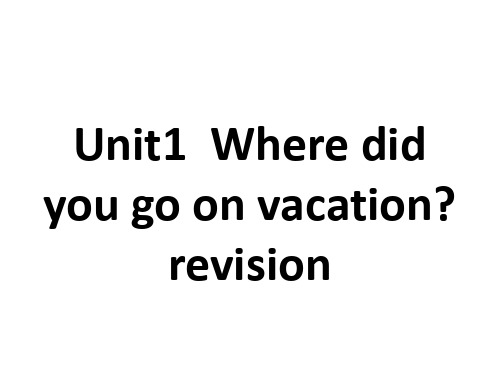
The songs sound beautiful.这些歌曲听起来 很优美。
过得高兴,玩得愉快
have a good\great\fun time (=enjoy oneself)
They had a good time yesterday.= They enjoyed themselves yesterday.
find—found找到
2.不定代词和不定副词的用法
some
body
any
one
every thing
no
where(疑问副
词)不定代词和不定副词
(1)左边的some、any、every、no与右 边的body、one、thing构成不定代词, some、any、every、no与右边的疑问副 词where构成不定副词;
2. 回顾一下在3b中所回答的问题的情况,然后 将这些句子按恰当的逻辑顺序排列在一起, 形成条理清晰的一段文字。
3. 可根据旅行经历再加一些恰当想像的句子。 4. 再次,阅读一遍短文,看有没有错误的句
子。
假如你和你的家人在四月八号这天参观了北 京,请你以日记的形式把这天的经历及感受 记录下来。 提示:1. 早上:参观颐和园(爬万寿山;在 昆明湖划船) 2. 中午:吃北京烤鸭 3. 下午: 逛王府井大街 参考词汇:颐和园 the Summer Palace; 万寿山 Longevity Hill;昆明湖Kunming Lake;王府井大街 Wangfujing Street;风 景 scenery
1. 定基调 体裁:应用文(日记);日记的主体部分为 记叙文 时态:谈过去的经历时,用一般过去时。 人称:写个人经历时,用第一人称。
Unit 1 Where did you go on vacation 全单元教案

Unit 1 Where did you go on vacation 全单元教案Unit 1 Where did you go on vacationSection A1 (1a―2d)一、教学目标1) 能掌握新单词:anyone, anywhere, wonderful, few, most。
2) 能掌握以下句型:①—Where did you go on vacation —I went to the mountains.②—Where did Tina go on vacation —She went to the beach.③—Did you go with anyone —Yes, I did./No, I didn’t.3) 能掌握语法:复合不定代词someone, anyone, something, anything 等的用法。
4)能掌握一般过去时的特殊疑问句、一般疑问句及其肯定和否定回答。
二、教学重难点1. 教学重点1) 用所学的功能语言交流假期去了什么地方旅行。
2) 掌握本课时出现的新词汇。
2. 教学难点1) 复合不定代词someone, anyone, something, anything等的用法。
2) 一般过去时的特殊疑问句的使用及答语。
三、教学过程1. Lead-in观看有关旅行的动画视频,进入本课时的主题——谈论过去的假期去了什么地方及做了些什么事情。
2. Presentation1)Show some pictures on the big screen. Let students read the expressions.2) Focus attention on the pictures. Ask: What can you see Say: Each picture showswhat a person did in the past. Name each activity and ask students to repeat:stayed at home, went to New York City, visited my uncle, went to summer camp,went to mountains, went to the beach, visited museums.Now, please match each phrase with one of the pictures next to the name of theactivity. Point to the sample answer.Check the answers. Answers: 1. f 2. b 3. g 4. d 5. c 6. a 7. e 3. Listening1) Point to the picture on the screen.Say: Look at the Picture A. Where did Tina go on vacation She went to mountains.Ask: What did the person do in each picture2) Play the recording the first time.3) Play the recording a second time.Say: There are three conversations. The people talk about what they did on vacation. Listen to the recording and write numbers of the names in the right boxes of the picture.4) Check the answers.4. Pair work1) Point out the sample conversation. Ask two students to read the conversation to the class.2) Now work with a partner. Make your own conversation about the people in the picture.3) Students work in pairs. As they talk, move around the classroom and give any help they need.4) Let some pairs act out their conversations.5. ListeningTell students that they will hear a conversation about three people’s talking about their vacations. Listen for the first time and fill in the chart. Then listen again and check Yes or No.1) Let students read the phrases in the chart of 2b.2) Play the recording the first time. Students listen and fill in the chart.3) Play the recording a second time for the students to check “Yes, I did.”or “No, I didn’t. ”4) Check the answers with the students.6. Pair work1) Let two students read the conversation between Grace, Kevin and Julie.2) Let students work in pairs and try to role-play the conversation.3) Ask some pairs to act out their conversations.7. Role-play1) First let students read the conversation and match the people and the places they went to.2) Let students act out the conversations in pairs.3) Some explanations in 2d:Long time no see. anywhere interesting took quite a few photosWhat about... anything special Not really.I just stayed at home most of the time to read and relax.Homework:用英语询问你的一位好朋友,她(他)假期去了哪里?看到了什么?并将此对话写在作业本上。
Unit-1-Where-did-you-go-on-vacation短语、重点句型、作文

Unit 1 Where did you go on vacationSection A一、短语1. be/go on vacation = take a vacation度假2. stay at home/school 呆在家3. go (out) with ... 和...一起(出)去4. take photos (of ...) (给...)拍照5. quite a few + 可数名词复数= many + 可数名词复数相当多,不少6.taste/feel/sound/look good 尝起来/感觉起来/听起来/看起来好7. have a good time = enjoy oneself 过得愉快,玩得开心8. Of course 当然,一定9. in the countryside 在乡下10.keep a diary 记日记11.go shopping 去购物12. seem (to be) + 形容词/名词好像是... seem to do sth. 好像做某事13. most of the time大多数时间go to summer camp 去夏令营14. nothing... but...只有...,除...之外什么也没有15. buy sth. for sb. = buy sb. sth. 为某人买某物16. be/get bored with ... 对...感到厌烦二、重点句型1. -Where did you go on vacation? 你在哪度的假?-I went to the mountains. 我去山上了。
2. -Oh, really? Did you go with anyone?真的吗?你跟别人一起吗?-Yes, I went with my mother. 是的,我跟我妈妈一起。
3. Long time no see. 好久不见。
4. Did you do anything special last month?你上个月做什么特别的事情了?5. I just stayed at home most of the time to read and relax. 我大部分时间只是待在家里看书和放松。
Unit_1_Where_did_you_go_on_vacation
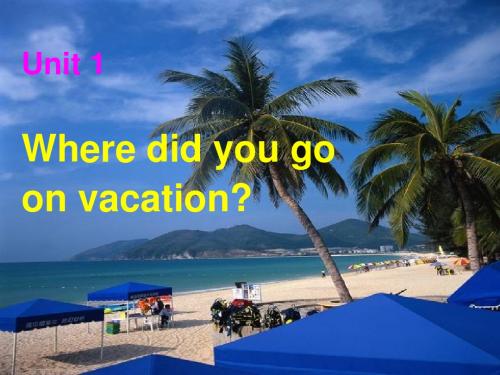
New York City The beach Stayed at home
2b Listen again. Check (√) Yes, I did or No, I didn’t for each question. Did you… Grace go with anyone? Yes, I did. No, I didn’t.
My friends’ vacation
Xiang Hua
Tom
Tina
Sally
Bob
Where did he go on vacation?
Statue of Liberty
New York City.
He went to New York City.
Where did they go on vacation?
c
a
7. visited museums
e
(1b) Listen and number the people in the picture.
1. Tina 2. Xiang Hua 3. Sally 4.Bob 5. Tom
2
1
4
5
3
• 1.Tina__________________with her family.__________had a good time. • _________was excellent. And Xiang Hua _____________________. 2.Sally did________.She just ___________. Bob did_________ __________. He _________his uncle. They went_______. But they didn’t ______ _______fish. 3.Tom went to______________.Did he go with _________?Yes,he went with his friends.______ had a good time.
Unit_1 Where_did_you_go_on_vacation导学案

Unit 1 Where did you go on vacation?第一课时 Section A 1a—2c【预习目标】知识与能力:能谈论过去发生的事件—学习一般过去时的用法,掌握规则动词的变换规则熟记一些常用的不规则动词能向小组成员用英语介绍生活中的日常活动,如:stay at home , go to the beach, do my home work, watch TV, visit my uncle, go to New York, etc.过程与方法:个人自学,小组合作,通过听说读写活动,提高解决问题,分析问题的能力情感态度与价值观:养成热爱活动和与别人交流的习惯,谈论自己的假期。
【课前预习】预习任务一A、预习P121的单词B、会读、会写la的短语C、你能说出一般过去式的变换规则吗?预习任务二A、试一试你能写出下列各词的过去式吗?Stay_________ do_________stop________Play_________is_________ like_________ Visit_________ are_________ buy_________B、快乐译一译stay at home_________ go to summer camp_________go to New York city______ go to the mountains_________visit my uncle_________ go to the beach_________【预习诊断】1. Mary wanted to have a word with Tom . She had to tell him .A.interesting somethingB. nothing interestingC. anything interestingD. something interesting2. I have two pens . One is red , is blue .A. the otherB. othersC. otherD. another3. There wrong with my radio .A. are somethingB. are anythingC. is anythingD. is something 【精讲点拨】一、学生两人一组展示活动,轮流介绍自己去过的一个地方,如:I went to Beijing/ the Great wall /went to the park etc.二、学生两人一组编对话讨论假期活动A:Where did you go on vacation? B:I went to the mountains.三、运用la、lb内容编对话.【精讲点拨】不定代词:other、the other、another、any、some……的用法限时作业一、单项选择1. "Where did Tina go _____vacation?""She ______the mountains."A. for the , goes toB. on, went toC. on , goes toD. for, went on2. "Did he go to Central Park?""__________."A. Yes, he doesB. No, he wasn'tC. Yes, he didD. No, he doesn't3."________you_______football yesterday?""Yes, I did."A.Are, playingB. Were , playedC.Do , playD. Did, play4."____Tom at school last week?""No, he wasn't."A. WasB. DidC.WereD.Is5."_____your vacation , Amy?""It was pretty good."A.What wasB.How isC. Where wereD. How wasIII.按要求进行句型转换。
unit-1-Where-did-you-go-on-vacation知识总结
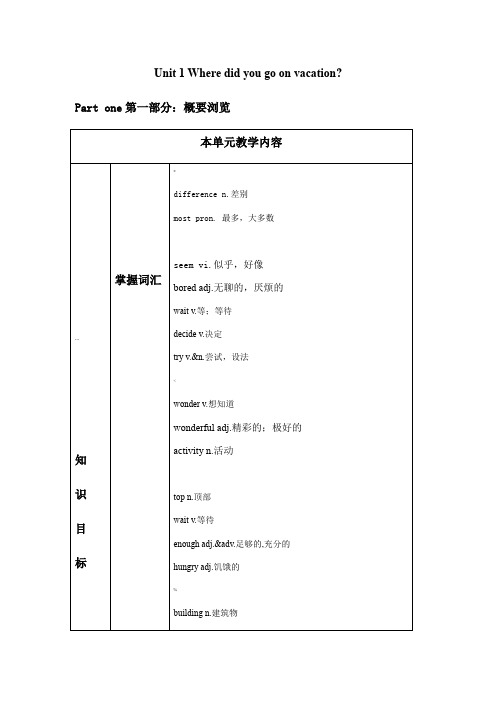
Unit 1 Where did you go on vacation? Part one第一部分:概要浏览)Part two 第二部分;知识点详解单词与短语讲解(一)quite a few的用法a few 意为“一些,若干(=some)”,后跟可数名词复数形式。
quite a few 意为“相当多;不少(=many)”后跟可数名词复数形式。
We took ____ ____ _____ _____ in the park last weekend.上周末,我们在公园里拍了相当多的照片。
【拓展】:few/a few/quite a few/little/a little/quite a little的用法1.most + 名词泛指多数,无范围most students大部分学生2.most + of + the (this/that/those/these等)+名词,指某一范围内的多数。
______ _____ _______students go to school by bike.这些学生们中的多数骑自行车去上学。
;(三)seem的用法seem“好像”,既可以后跟___________,又可以后跟___________。
【活学活用】1.The pig seems ___________(healthy/ healthily).2.Tom seemed ___________(know/ to know) the test result.3.I seem__________(have)a cold【拓展】(1.It seems+that从句看起来好像…;似乎….It seems that he is happy.=He seems _____ _____ happy. 他似乎很快乐。
2.seem like….好像,似乎…..It seems like a good idea.它似乎好像一个好主意。
新目标版八年级英语上册:Unit-1-where-did-you-go-on-vacation全单元

Unit1 where did you go on vacation?(Section A 1a—1c)预习检测:1.写出下列动词的过去式:go _______________ stop ___________________ visit _____________study____________do __________ride____________ take_____________ drive__________ arrive___________walk______________________ sleep ___________keep___________ get___________ 2.翻译下列短语:参加夏令营______________________________ 去大山________________________________去海滩_______________________________参观博物馆________________________________呆在家_______________________________ 拜访我的叔叔_____________________________任何特殊的事情_______________________________外出______________________________语法回顾:动词过去式构成规则用词的正确形式填空1.I _________( like ) oranges when I was young(年轻的).But now I __________(not like)them.2. My mother often _________( stay) at home on Sundays, but last Sunday she_________( not stay) at home ,she _________(go) to the park.3. Wei Hua __________ (have)a busy day yesterday.4.He ___________(visit) the Great Wall(长城)last year.5.We____________(have) a good time yesterday.6.We often __________(go) to school by bus last year.7.I __________(live)in the village when I was a child.9.Mike__________(see) a big tiger in the park last year.10.Sam___________ (do) the housework yesterday.11.________(do) you _________(enjoy) yourself yesterday?12.________(do)you __________(play) the violin in the art room yesterday?No, I didn't. I___________(draw)some pictures there.选择填空( ) 1. She watered the flowers _____. A tomorrow B sometimes C yesterday morning( ) 2.What ____ Mike do last weekend ? A do B does C did( ) 3. I ___ my room last Sunday. A cleaned B clean C am cleaning( ) 4. I often help my mother _____ housework. A does B did C do( ) 5. _____ you _____ TV last night. A Do, watch B Did, watch C Did, watched( ) 6. Did your father write an e-mail yesterday? A Yes, he did. B Yes, he does C No, he don’t( ) 7.They _____ on a trip in February ,2007. A are going B going C went( ) 8.We’re going to _____mountains tomorrow. A climb B climbed C climbing( ) 9. ____ he ____ football two days ago? A Does , play B Did , played C Did , play( ) 10.Good afternoon, Miss Lee. How does Mike feel? He’s tired . He ____ a lot of work ______ .A does , this morningB do , this morningC did , this mornUnit1 where did you go on vacation?(Section A 2a—3c)小试牛刀:1. - --Do you have ____________ to eat? (anything /something)---No, I don’t have ________________to eat. (anything /something)2. Would you like ____________ to eat? (anything /something) –Yes, please.3. Something _______(is/ are /am) wrong with my watch.4. There is ___________(something interesting / interesting something) in the news paper.五、反馈检测:(一)汉译英:1上个月_________________ 2.瀑布______________ 3.相当多_________________4.拍照/照相_________________5.大多数时间_________________6.第一次_________________.7.认为,思考________________8.很久没有见面!______________________________________9.那是我第一次去三亚。
Unit_1_where_did_you_go_on_vacation知识点详解
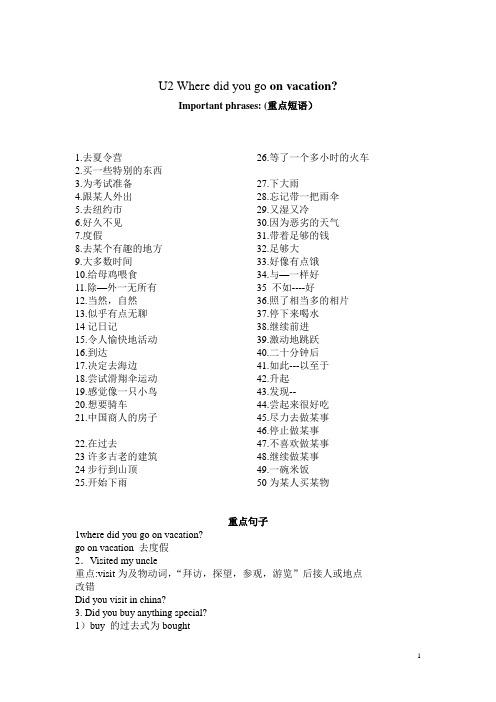
U2 Where did you go on vacation?Important phrases: (重点短语)1.去夏令营2.买一些特别的东西3.为考试准备4.跟某人外出5.去纽约市6.好久不见7.度假8.去某个有趣的地方9.大多数时间10.给母鸡喂食11.除—外一无所有12.当然,自然13.似乎有点无聊14记日记15.令人愉快地活动16.到达17.决定去海边18.尝试滑翔伞运动19.感觉像一只小鸟20.想要骑车21.中国商人的房子22.在过去23许多古老的建筑24步行到山顶25.开始下雨26.等了一个多小时的火车27.下大雨28.忘记带一把雨伞29.又湿又冷30.因为恶劣的天气31.带着足够的钱32.足够大33.好像有点饿34.与—一样好35 不如----好36.照了相当多的相片37.停下来喝水38.继续前进39.激动地跳跃40.二十分钟后41.如此---以至于42.升起43.发现--44.尝起来很好吃45.尽力去做某事46.停止做某事47.不喜欢做某事48.继续做某事49.一碗米饭50为某人买某物重点句子1where did you go on vacation?go on vacation 去度假2.Visited my uncle重点:visit为及物动词,“拜访,探望,参观,游览”后接人或地点改错Did you visit in china?3. Did you buy anything special?1)buy 的过去式为boughtbuy sth.for sb.=buy sb sth.我为Tom买了一个礼物2)anything 不定代词“某物,某事”主要用于疑问句和否定句中一旦anything用于可定句中,则意为“任何事,任何东西”Eg You can ask me anything you want to know3)★形容词修饰不定代词要后置4.Oh,did you go anything interesting?这是一般过去时中不含was/were的句子在变一般疑问句时,需用助动词did。
最新人教新目标八年级上册英语Unit 1 Where did you go on vacation全单元导学案

第1单元Where did you go on vacation?Section A 单词anyone pron.任何人anywhere adv.在任何地方wonderful adj.精彩的;绝妙的few adj.&pron.不多;很少most adj.,adv.&pron.最多;大多数something pron.某事;某物nothing pron.没有什么;没有一件东西everyone pron.每人;人人;所有人myself pron.我自己;我本人yourself pron.你自己;您自己hen n.母鸡pig n.猪seem v.好像;似乎;看来bored adj.厌倦的;烦闷的someone pron.某人diary n.日记;记事簿短语go on vacation去度假anything special什么特别的stay at home待在家里have a good time玩得开心quite a few相当多;不少of course当然;自然句型1.—Did you go out with anyone? 你和别人一起出去的吗?—No. No one was here. Everyone was on vacation.不。
没有人在这里。
大家都去度假了。
2.—How was the food? 食物怎么样?—Everything tasted really good! 每样东西尝起来都很美味!Section B 单词activity n.活动enjoyable adj.有乐趣的;令人愉快的decide v.决定;选定try v.& n.尝试;设法;努力bird n.鸟bicycle n.自行车;脚踏车building n.建筑物;房子trader n.商人wonder v.想知道;琢磨difference n.差别;差异top n.顶部;表面wait v.等待;等候umbrella n.伞;雨伞wet adj.湿的;潮湿的;下雨的duck n.鸭below prep.&adv.在……下面;到……下面hungry adj.饥饿的as adv.像……一样;如同conj.当……时;如同hill n.小山;山丘dislike v.&n.不喜爱(的事物);厌恶(的事物)enough adj.&adv.足够的(地);充足的(地);充分的(地)短语feel like给……的感觉;感受到because of因为arrive in到达 a lot of许多;大量的take some photos拍一些照片too many太多句型1.There are a lot of new buildings now, but many of the old buildings are still there. 现在那里有许多新的建筑物,但是许多老式的建筑物还在那里。
Unit-1-Where-did-you-go-on-vacation
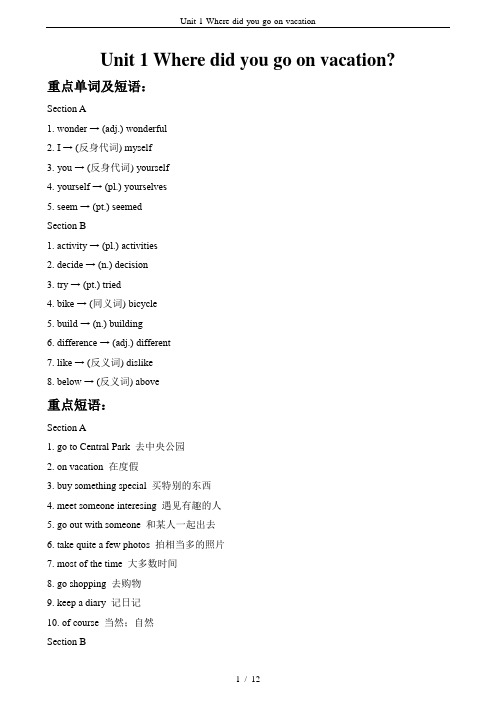
Unit 1 Where did you go on vacation?重点单词及短语:Section A1. wonder → (adj.) wonderful2. I → (反身代词) myself3. you → (反身代词) yourself4. yourself → (pl.) yourselves5. seem → (pt.) seemedSection B1. activity → (pl.) activities2. decide → (n.) decision3. t ry → (pt.) tried4. bike → (同义词) bicycle5. build → (n.) building6. difference → (adj.) different7. like → (反义词) dislike8. below → (反义词) above重点短语:Section A1. go to Central Park 去中央公园2. on vacation 在度假3. buy something special 买特别的东西4. meet someone interesing 遇见有趣的人5. go out with someone 和某人一起出去6. take quite a few photos 拍相当多的照片7. most of the time 大多数时间8. go shopping 去购物9. keep a diary 记日记10. of course 当然;自然Section B1. have a good time 玩得高兴;过得愉快2. go to the beach 去海滩3. feel like 感觉像4. the houses of the Chinese traders 中国商人的房子5. a lot of new buildings 许多新的建筑物6. in the past 在过去7. over an hour 一个多小时8. too many people 太多的人9. get to the top 到达顶部10. because of the bad weather 因为不好的天气11. one bowl of fish 一碗鱼肉12. another two hours 另外两个小时13. the top of the hill 山顶14. learn something important 学习重要的东西Self Check1. go to the countryside 去乡下2. in the shopping center 在购物中心3. have a fun time 玩得高兴;过得愉快4. after three hours 三个小时以后5. keep going 一直走6. twenty minutes later 20分钟后重点句子:1. Where did you go on vacation?你去哪儿度假的?2. Long time no see.好久不见。
Unit1-Where-did-you-go-on-vacation(全单元课件)
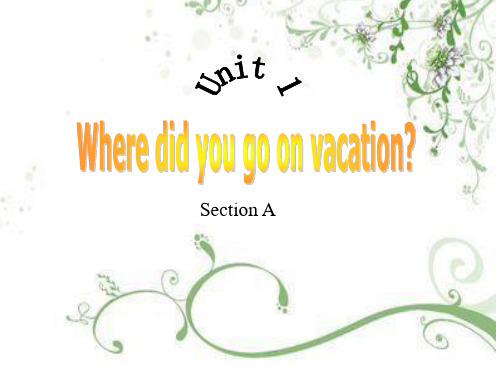
g
Where did Tom go on vacation?
He went to summer camp.
d
Where did Sally go on vacation?
She stayed at home.
f
Where did Xiang Hua go on vacation?
I went to the Great Wall.
She visited the USA. She went to New York City.
Where did she go on vacation?
They went to summer camp. /kæmp/
Where did they go on vacation?
study for tests?
go out with anyone?
√
√
√
√
√
√
√
√
√
Central park 中央公园位于美国纽约中心的曼哈顿地区,是纽约最大的都是公园,四季皆有不同美景,独享纽约“后花园”之美称。它不仅是纽约市民心目中的休闲胜地,也是世界各地游客向往的著名公园。
Section A
Language Goal
Talk about past events
the Great Wall
the Palace Museum
Tainan Men Square
a Beijing Hutong
Beijing
Shanghai
Suzhou
Where did you go on vacation?
1a Match the activities with the pictures
Unit_1_Where_did_you_go_on_vacation?单元知识点和练习题

Unit 1 Where did you go on vacation?一、知识点1. go on (a) vacation 去度假:be on (a)vacation 在度假/take a vacation休假2. go to the mountains去爬山go the beach 去沙滩go to the summer camp 去夏令营3.go+V-ing意为“去…”,多用于进行体育活动和业余娱乐活动,总结:go shopping/ go fishing/ go skating/ go swimming/ go camping/ go boating/ go hiking4. stay vi.停留,逗留,待在stay at home待在家里/ stay up (late)深夜不睡/熬夜5. most pron.大多数Most of后面的名词前要用冠词,人称代词用宾格;做主语时,of后的名词是复数,后面的谓语动词用复数;of后的名词是单数,后面的谓语动词用单数,如:Most of us like learning English. Most of the apples are delicious. / Most of the apple is bad.6. buy sth. for sb.(=buy sb. sth.)给某人买某物,如:I bought a pair of new glasses for my mother.=7. How do you think of….?你认为……怎么样?例如:你认为这个电影/这本书/这个国家/这个故事怎么样?=what do you think of …?/How do you feel about….?8 ed 和ing 结尾的动词9. seem好像,似乎,看起来①主语+seem to do sth. Your father seems to like playing tennis very much.(变否定句)②主语+seem (to be)+adj. The classroom seems (to be) very clean.③It seems +that从句It seems that it will snow soon./ It seems that you are not happy today.10. problem大的问题,难题,需要用行动解决;question因疑惑而提出的,需要口头回答。
八年级上册Unit 1 Where did you go on vacation单元语法知识汇总
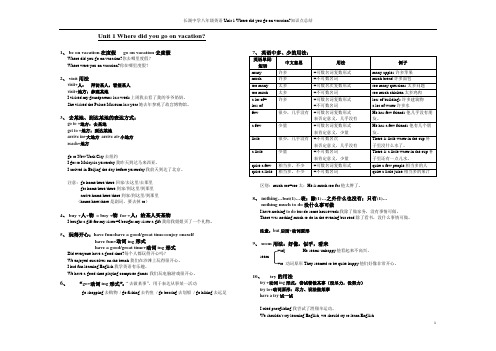
Unit 1 Where did you go on vacation?1、be on vacation在度假go on vacation去度假Where did you go on vacation?你去哪里度假?Where were you on vacation?你在哪里度假?2、visit用法visit+人:拜访某人,看望某人visit+地方:参观某地I visited my grandparents last week.上周我去看了我的爷爷奶奶。
She visited the Palace Museum last year.她去年参观了故宫博物馆。
3、去某地、到达某地的表达方式:go to +地方:去某地get to +地方:到达某地arrive in+大地方arrive at+小地方reach+地方go to New York City去纽约I got to Malaysia yesterday.我昨天到达马来西亚。
I arrived in Beijing the day before yesterday.我前天到达了北京。
注意:go home/here/there回家/去这里/去那里get home/here/there到家/到这里/到那里arrive home/here/there到家/到这里/到那里(home/here/there是副词,要去掉to)4、buy +人+物= buy +物for +人:给某人买某物I bought a gift for my sister.=I bought my sister a gift.我给我姐姐买了一个礼物。
5、玩得开心:have fun=have a good/great time=enjoy oneselfhave fun+动词ing形式have a good/great time+动词ing形式Did everyone have a good time?每个人都玩得开心吗?We enjoyed ourselves on the beach.我们在沙滩上玩得很开心。
_Unit1_Where_did_you_go_on_vacation__Period_1教案

重点
Talk about the past activities
难点
indefinite pronoun
教法
task/situation-based teaching
教
学
反
思
T: Where did she go on vacation?
S: She went to New York City.
T: Where did they go on vacation?
S:
教学过程
备课札记
1a. Match the activities with the pictures.
Step3 listening
Step 4. Pairwork 1c
A: Where did Tina go on vacation?
B: She went to the mountains.
Step 5. Listening 2a/2b
Listen and fill in the blanks
Step 6 Role-play conversations between Grace, Kevin and Julie.
Hello,everyone. Let me tell you something about my group members’ summer vacation….
As we can see, everyone had a good time.
Step 8 Homework
Unit_1_Where_did_you_go_on_vacation知识点

Unit 1 Where did you go on vacation?王紫短语:go on vacation stay at home go to the mountains go to the beach visit museums go to summer camp quite a few study forgo out most of the time taste good have a good timeof course feel like go shopping in the past walk aroundtoo many because of one bowl of find out go ontake photos something important up and down come up语法:Where did you go on vacation? I went to New York City.Did you go out with anyone? No, No one was here. Everyone was on vacation. Did you buy anything special? Yes, I bought something for my father.How was the food? Everything tasted really good.Did everyone have a good time? Oh,yes. Everything was excellent.惯用法:1. buy sth for ab./ buy sb. sth 为某人买某物2. taste + adj. 尝起来……3. nothing ….but + V.(原形) 除了……之外什么都没有4. seem + (to be) + adj 看起来5. arrive in + 大地方/ arrive at + 小地方到达某地6. decide to do sth. 决定做某事7. try doing sth. 尝试做某事/ try to do sth. 尽力做某事8. enjoy doing sth. 喜欢做某事9. want to do sth. 想去做某事10. start doing sth. 开始做某事11. stop doing sth. 停止做某事12. look + adj 看起来13. dislike doing sth. 不喜欢做某事14. Why not do sth. 为什么不做…….呢?15. so + adj + that + 从句如此……以至于……16. tell sb. (not) to do sth. 告诉某人(不要)做某事17. keep doing sth. 继续做某事18. forget to do sth. 忘记去做某事/ forget doing sth 忘记做过某事王紫词语辨析:1. anywhere 与somewhere 两者都是不定副词。
- 1、下载文档前请自行甄别文档内容的完整性,平台不提供额外的编辑、内容补充、找答案等附加服务。
- 2、"仅部分预览"的文档,不可在线预览部分如存在完整性等问题,可反馈申请退款(可完整预览的文档不适用该条件!)。
- 3、如文档侵犯您的权益,请联系客服反馈,我们会尽快为您处理(人工客服工作时间:9:00-18:30)。
Period One (Section A 1a—1c)温馨提示:预习是高效学习的前提,请同学们认真完成预习部分的内容和任务一、学习目标1.1.能听、说、读、写、单词, anyone anywhere wonderful few quite a few most ,2.复习回顾动词一般过去时态的用法。
3.掌握和运用下列语句:1).Where did you go on vacation? ----I stayed at home .2). Where did Tina go on vacation?? ----She went to the beach.二、课前自主学习:(一)预习指导1. 自主朗读本课时单词仔细观察单词中各字母的发音特点并记忆:2. 阅读学习下面的―语法回顾‖,然后朗读句型3.朗读理解本课1a部分的短语和学习目标的重点句型。
4、认真观察1a的图画,将词语与图片搭配。
(二)预习检测:1.写出下列动词的过去式:go _______________ stop ___________________ visit _____________study____________do __________ride____________ take_____________ drive__________ arrive___________walk______________________ sleep ___________keep___________ get___________2.翻译下列短语:参加夏令营________________________________ 去大山________________________________ 去海滩________________________________参观博物馆________________________________ 呆在家________________________________ 拜访我的叔叔______________________________ 任何特殊的事情________________________________外出______________________________四、课堂学习流程:(一)检查预习检测(二)独学:内容为:(1)复习回顾语法,(2)自读本课时相关单词、短语和句型:(三)对学:对子之间相互检查独学的内容发现不会的马上交流探讨。
(四)群学--合作学习,勇敢质疑:内容为:(1)主要由各组探讨1、2环节中大家不会(读、、/懂)的内容,(2)操练本课时的重点句型(见学习目标),(3)如何展示,在组内预展示好。
(四)展示1.词汇:◆展示本课时要学的生词并负责组织全班学习然后完成1a的练习。
anyone 任何人anywhere 任何地方anything 任何事物wonderful 精彩的few少量的quite a few 相当多的,不少的,most最多的,大多数(many 和much的最高级形式) 。
2.短语朗读(课本1a部分)3.句型朗读和操练1).Where did you go on vacation? ----I stayed at home .2). Where did Tina go on vacation?? ----She went to the beach.4.听力训练:1b、2a、2b的录音完成有关任务。
5、句型操练模仿2c编对话,然后对子展示。
(展示组抽查各组代表对子)A: ______________________________________________________________B:______________________________________________________________A:____________________________________________________________B:______________________________________________________________五、反馈检测:用词的正确形式填空1.I _________( like ) oranges when I was young(年轻的).But now I __________(not like) them.2. My mother often ____________( stay) at home on Sundays, but last Sunday she _________( not stay) at home ,she_________(go) to the park.3.Wei Hua __________ (have)a busy day yesterday.4.He ___________(visit) the Great Wall(长城)last year.5.We____________(have) a good time yesterday.6.We often __________(go) to school by bus last year.7.I __________(live)in the village when I was a child.9.Mike__________(see) a big tiger in the park last year.10.Sam___________ (do) the housework yesterday.11.________(do) you _________(enjoy) yourself yesterday?12.________(do)you __________(play) the violin in the art room yesterday?No, I didn't. I___________(draw)some pictures there.选择填空( ) 1. She watered the flowers ________. A tomorrow B sometimes C yesterday morning( ) 2.What ____ Mike do last weekend ? A do B does C did( ) 3. I ___ my room last Sunday. A cleaned B clean C am cleaning( ) 4. I often help my mother _____ housework. A does B did C do( ) 5. _____ you _____ TV last night . A Do, watch B Did, watch C Did, watched( ) 6.---Did your father write an e-mail yesterday? A Yes, he did. B Yes, he does C No, he don’t- 1 -( ) 7.They _____ on a trip in February ,2007. A are going B going C went( ) 8.We’re going to _____ mountains tomorrow . A climb B climbed C climbing( ) 9. ____ he ____ football two days ago? A Does , play B Did , played C Did , play( ) 10.----Good afternoon, Miss Lee. How does Mike feel? -----He’s tired . He ____ a lot of work ______ .A does , this morningB do , this morningC did , this mornPeriod Two (Section A 2a—3c)一、学习目标1.能听、说、读、写、单词:waterfall瀑布wonderful精彩的绝妙的, excellent 优秀的/极好的,something某事物everyone每一个人of course当然,myself 我自己yourself你自己/你们自己,hen母鸡pig 猪seem似乎bored 厌倦的,烦人的someone某人diary日记2.进一步学习动词一般现在是的一般疑问句。
3.掌握和运用下列语句:1).Did you go to the beach last Saturday? ----Yes, I did. No, I didn’t .2). Did Tina visit your uncle on vacation?? ---- Yes, she did. No, she didn’t.4. 探究符合不定代词的简单用法:(符合不定代词:something, somebody, someone; anything somebody, anyone; everything ,everybody, everyone ; nothing nobody , no one ) (副词:somewhere, anywhere, everywhere no where)二、课前自主学习:(一)预习指导1.自主朗读本课时单词仔细观察单词中各字母的发音特点并记忆:2. 朗读理解本课时重点句型学习目标2,阅读、朗读2d 对话找出生词和难点并在文中标出来。
3. 阅读学习语法附录中关于复合不定代词的用法,然后试做3a 和3b.(二)预习检测:四、课堂学习流程:(一)检查预习检测(二)独学:内容为:(1)自读本课时相关单词、句型和2b的对话:(2)复习回顾有关语法后进一步检查3a 和3b.的完成情况。
(三)对学:对子之间相互检查独学的内容发现不会的马上交流探讨。
(四)群学--合作学习,勇敢质疑:内容为:(1)主要由各组探讨1、2环节中大家不会(读、、/懂)的内容,(2)操练本课时的重点句型(见学习目标),(3)如何展示,在组内预展示好。
(四)展示1.词汇:◆展示本课时要学的生词并负责组织全班学习。
waterfall瀑布wonderful精彩的绝妙的, excellent 优秀的/极好的,something某事物everyone每一个人of course当然,myself 我自己yourself你自己/你们自己,hen母鸡pig 猪seem似乎bored 厌倦的,烦人的someone某人diary日记。
